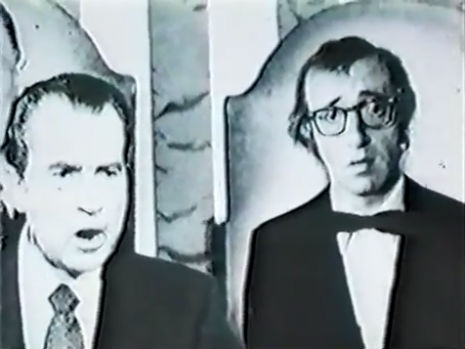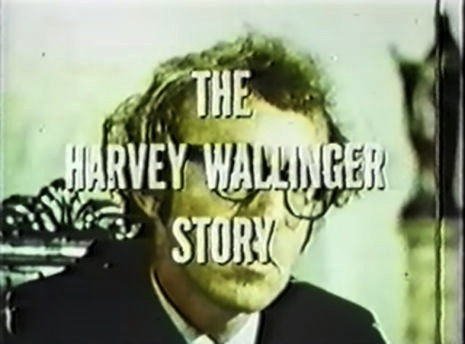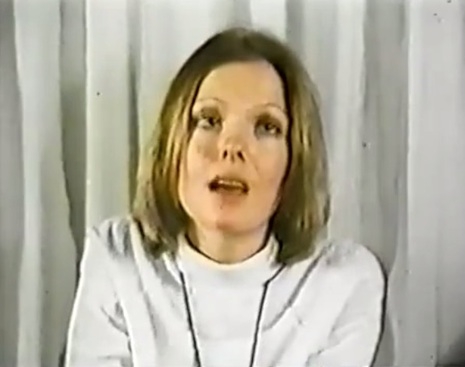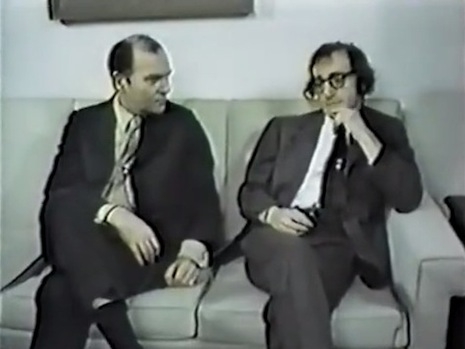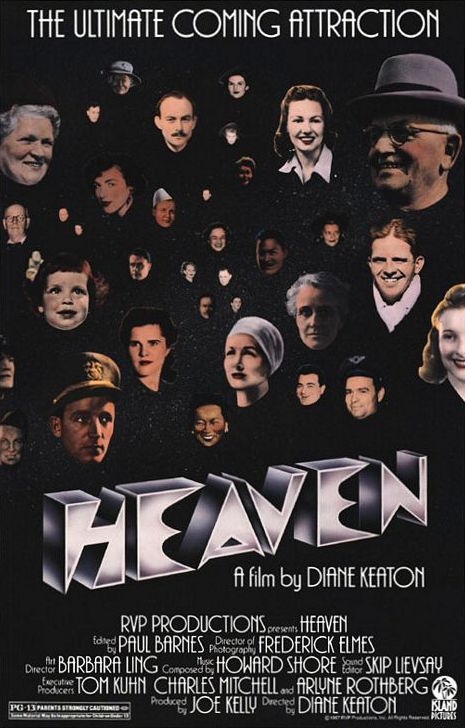
In 1987, the news that Diane Keaton had directed a movie about the celestial firmament was met with bumfuzzled curiosity among the general populace, who had hitherto not had the slightest notion that she had harbored any such ambitions. The resultant movie, Heaven, was about as distinctive a film as came out in the 1980s and certainly did a good job of representing Diane Keaton.
The movie is a combination of found footage and subject interviews, most of whom appear to have been rounded up in a dragnet at Venice Beach. The movie feels very California, both in the number of pop culture references that get dropped as well as Keaton’s evident assumptions that the Christian heaven is most likely bunk and that the New Agers or the Zen people probably have it figured out. Of God Himself, one intense lady says, “I see him like Groucho Marx, and he’s always playing tricks on us. When we think we’ve got it, we’re sitting in a pile of cow manure, so he really is a practical joker.” One fella muses that in heaven “I’ll be just like Burt Reynolds or any other star” while another identifies it as the site where everyone wins an Oscar. Asked whether there is sex in heaven, one dude blurts, “Heaven is an orgasm! I mean, why not? It’s the best!” which comment embarrasses his girlfriend no end. Just in case we get bored, there arrives the unmistakable image of boxing promoter Don King to explain his take on heaven.
The music on the movie was the responsibility of frequent Cronenberg collaborator Howard Shore (who also worked on some Tolkien movies) as well as CD compilation empresario Hal Willner. The canny musical choices include the Dream Academy’s obscure gem “Heaven” and The Residents’ “Walter Westinghouse.”
One of the best elements of the movie are the incredible art deco intertitles, which were done by Geppetto Studios in Brooklyn. Here are a couple examples:
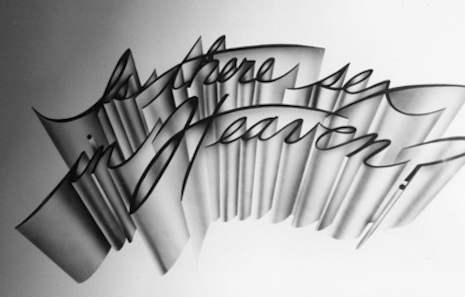

The found footage relies a lot on hokey black-and-white movies as well as bizarre footage from evangelists and so forth. The middle American true believers come in for a hard time in Heaven. Two of the quotes are so good that I’m going to reproduce them here in full; the first we only hear as an audio track:
The summer is ended, and you’re not prepared to meet God. The summer is ended; why has God let this happen to us? GONE will be the late night drunkenness, GONE will be the massage parlor, GONE will be the nude beaches, GONE will be the bars on every corner, GONE will be the automobiles and the riches, GONE will be the television sets and the movies, GONE will be the Chevy Chases and the Erik Estradas and the weirdos of Hollywood!
I don’t know about you, but I’m not soon going to forget the frenzied cry of “GONE will be the Chevy Chases and the Erik Estradas and the weirdos of Hollywood!”
In the second one, we have video—I’d love to find out who this guy is, he’s the big beardo who pops up during the “sex” segment around minute 43 to explain,
Sex is all right. I like spitting, too. I like washing my eyes, too. I like getting a haircut, too. I like scratching. But I’m not gonna miss it, no. You see, if you miss something, that’s because you’ve made it your god. But if sex is your god, which it usually is, look down that perverted town of Hollywood. On Fag Day, when they got their giant phallix parading up and down the street. You see, this is their god! You see? Well, one day, their god will be dead! They’ll be alone, and they won’t have a big phallic to lay on, to cuddle, fondle, and enjoy.
Oh shit, Fag Day is coming up and I haven’t even started shopping yet!
Heaven probably would have benefited if Keaton had gotten out of El Lay and found some folks in a less west coastal environment to talk to, and the use of found footage feels dated, like a segment on Night Flight. It’s almost disorienting to see a documentary on a subject that almost by definition, nobody knows anything about, but in a way, that very fact excuses Keaton’s offhanded approach. It might have been better to corral a handful of people who had had life-after-death experiences and really figure out what was going on there, but that’s not what Keaton was interested in. If Heaven is about anything, it’s about the folly of people. It’s a difficult movie to dislike, and it’s a hell of a lot more rewarding than the otherwise similar, but insipid, What the #$*! Do We Know!?






